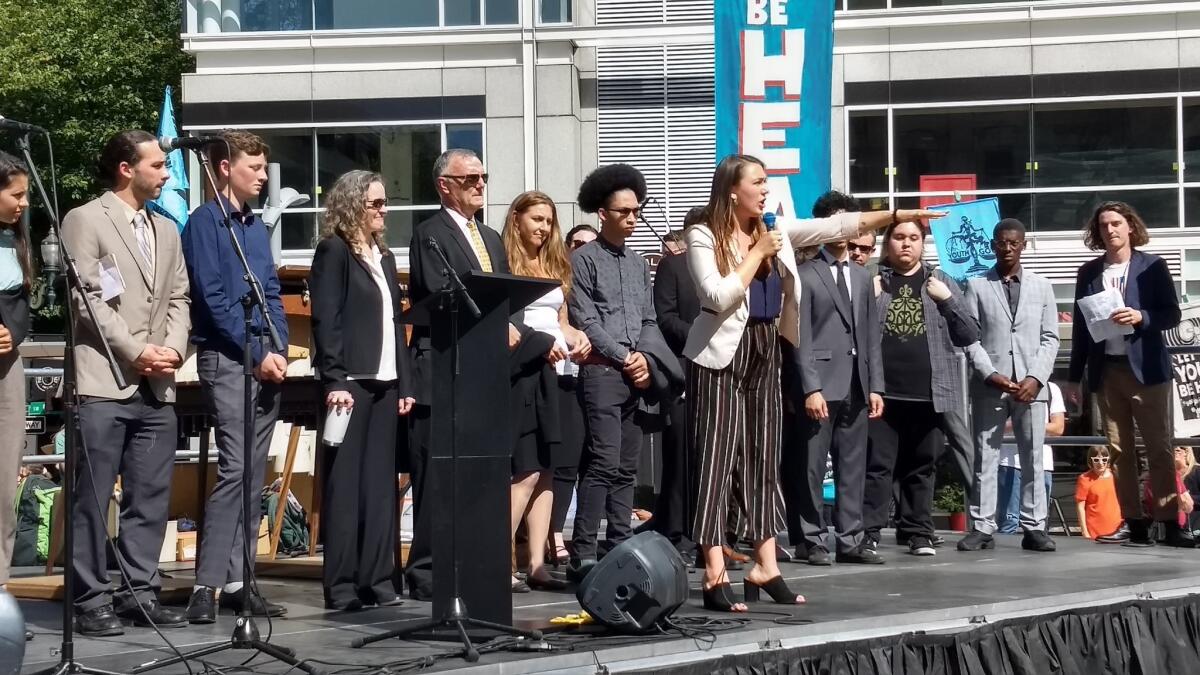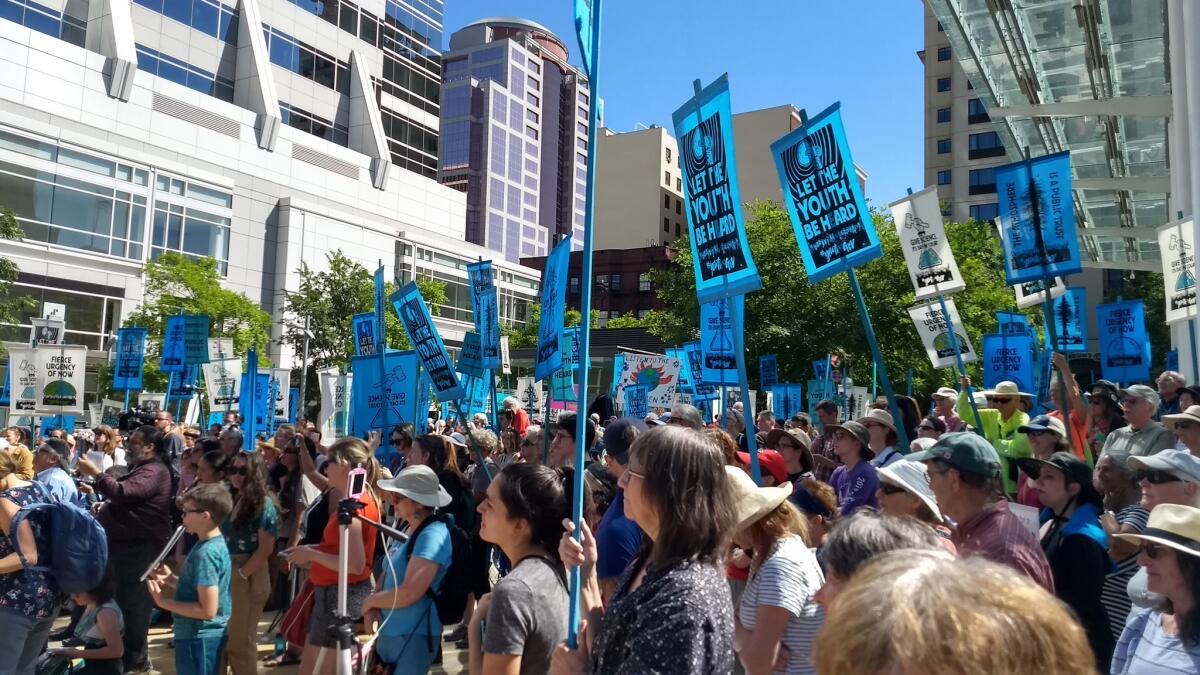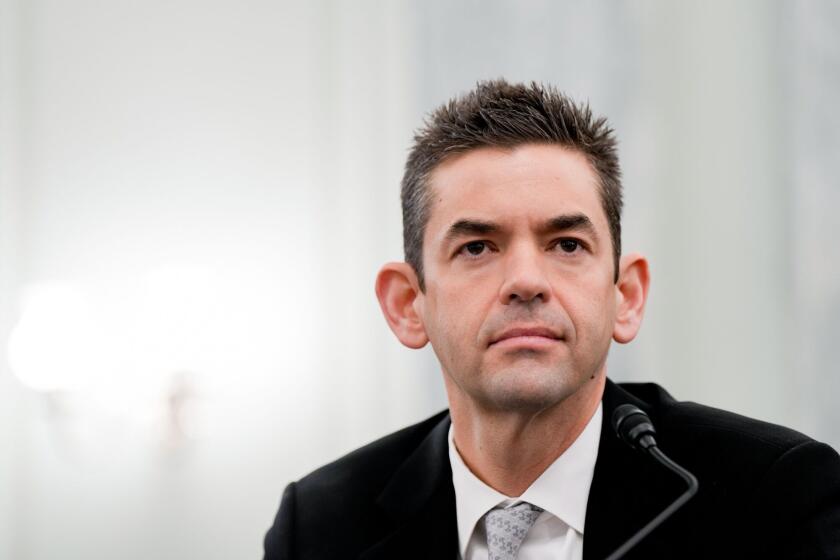Lawyers are optimistic that the youths’ climate change lawsuit will go to trial

- Share via
Reporting from Portland, Ore. — Attorneys for 21 young Americans who accuse the U.S. government of violating their constitutional right to a safe and livable climate said they are hopeful that they’ll get to take their case to trial after a pivotal appeals court hearing Tuesday.
During the intense one-hour session before the U.S. 9th Circuit Court of Appeals, three judges asked numerous questions about the type of remedy the court might provide to address the injuries the young plaintiffs say they have suffered because of government actions that exacerbated global warming.
For the record:
9:55 a.m. June 5, 2019An earlier version of this article said that University of Oregon law professor Mary Wood wrote an amicus brief supporting the young Americans who are suing the U.S. government over climate change. Wood joined the brief but did not write it.
”Remedy comes at the end of the case,” said Philip Gregory, an attorney for the plaintiffs. And he found their focus on it encouraging. He said he felt “very positive” about the day’s proceedings.
The judges will decide whether the case known as Juliana vs. U.S. gets thrown out or gets a full airing in district court.
The plaintiffs say climate change has damaged their homes by making storms more extreme; worsened their respiratory health by generating more wildfire smoke and longer pollen seasons; and caused psychological distress as they face the prospect of growing up in a fundamentally altered world. In their lawsuit, they claim the government bears responsibility for infringing upon their rights to life, liberty and property through its ongoing support of fossil fuels, the primary driver of climate change.
Specifically, the suit points to the greenhouse gas emissions that result from policies such as leasing federal lands for coal mining and oil and gas extraction, setting lax vehicle emission standards, and subsidizing the fossil fuel industry.
Direct U.S. subsidies, such as tax credits, total $20 billion per year, according to a 2017 analysis by Oil Change International, a group that advocates for clean energy. And indirect subsidies, like allowing emitters to avoid paying for the true cost of air pollution, raise the number to $650 billion annually, the International Monetary Fund calculated in a recent report.
The Department of Justice has been fighting the case since 2015. It has made multiple attempts to have the case thrown out, and has asked the Supreme Court to halt the case twice; both requests were declined.
Is it our constitutional right to live in a world safe from climate change? »
Government lawyers argue that the case had numerous flaws, each of which should disqualify it from proceeding to trial. Among them: There is no constitutional right to a stable climate, and the youths should challenge specific federal policies under the Administrative Procedure Act instead of through a constitutional lawsuit.
Jeffrey Clark, who represented the government, called the case “a direct attack on the separation of powers.” Government lawyers have long maintained that Congress and the president should set climate policy, and that the courts have no business getting involved.
If the plaintiffs get their way, one district court judge would have sweeping power over many executive agencies, Clark argued. “That is something that is radical,” he told the court.
But Judge Andrew Hurwitz pushed back with a hypothetical scenario. What if raiders were kidnapping children and murdering them, and the other branches of government did nothing? Should the courts intervene then?
Clark said the answer was no, that was not the role of the judiciary. “However painful that might be,” the remedy would be to remove the unresponsive lawmakers from office, he said.
At first, Hurwitz characterized the lawsuit as being about government inaction, and asked Julia Olson, the lead attorney for the plaintiffs, to name an instance when failure to act deprived citizens of their rights.
Olson, the executive director of the nonprofit Our Children’s Trust, responded that the case was in fact about the government’s affirmative actions — like allowing fossil fuels to be extracted from public lands and permitting the construction of pipelines.
Mary Wood, a law professor at the University of Oregon who joined an amicus brief supporting the plaintiffs, said she thought Olson’s argument registered with the judges. “There was an epiphany,” she said.
Hurwitz also pointed out that tackling government policies one at a time would not address the systemic nature of the plaintiffs’ complaint.
“The agency would say there’s no evidence that our teeny tiny little action here deprives you of constitutional rights,” he said. “And they would be correct.”
It’s less clear whether the judges agree that the Constitution protects a right to a safe and livable climate. Olson argued that this right is already covered by the 5th Amendment’s protections for things such as personal security, family autonomy and bodily integrity, and that recognizing it doesn’t require the court to break new ground. But Hurwitz disagreed.
“You shouldn’t say this is an ordinary suit,” he said. “You are asking us to do a lot of new stuff.”
Judge Mary Murguia was concerned about what a possible remedy might look like. The youths want the courts to order the government to come up with a wide-ranging plan to reduce greenhouse gas emissions, and Murguia asked whether there was a precedent for such an extraordinary measure.
“We would not be striking down anything. We would not be telling an agency do to something different. Instead, we would be affirmatively — from what I can tell —telling the government to do something,” Murguia said. “I’m trying to figure out if we’ve done anything like that on this scale.”
Olson pointed to cases such as Brown vs. Board of Education, which ordered the desegregation of public schools.
“Whenever there is a government system that is causing such catastrophic infringement to fundamental rights,” she said, the court must “issue a decree that can redress that constitutional violation.”
While the plaintiffs’ lawyers came away feeling optimistic, others said the judges didn’t give any clear sign as to which way they were leaning. “They were tough on both sides,” said Sean Hecht, a law professor a UCLA.
He said the decision may turn on whether the judges agree with Olson that the right to a stable climate is an extension of existing bedrock principles or whether they agree with the government that it’s something new.
It could be months before the judges rule on whether the trial the youths are seeking can get underway in a federal district court in Eugene, Ore., attorneys said.

But the plaintiffs didn’t wait to champion their cause. After the hearing, they emerged from the courthouse and were greeted by cheers from scores of supporters across the street.
The crowd then marched to a rally at a park several blocks away. Many people carried signs with slogans like “Drilling is Killing” and “Give science its day in court.”
Hundreds more supporters were waiting in the park, eager to hear from the plaintiffs. One of the first to speak was 11-year-old Levi Draheim of Satellite Beach, Fla., who was dressed up in a gray suit, red shirt and tie.
“I have a long time left to deal with the consequences of climate change,” he said. “How am I supposed to enjoy life, liberty, and property if, one day, the island that I live will be under water?”
Then came Vic Barrett, a 20-year-old plaintiff from White Plains, N.Y., who talked about having to face off against his own government to protect his rights.
“We’re learning every day that we’re the ones that must secure our future.”





